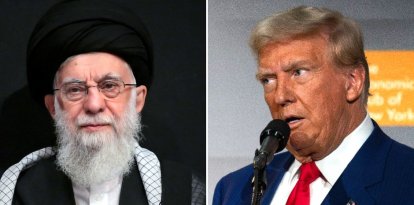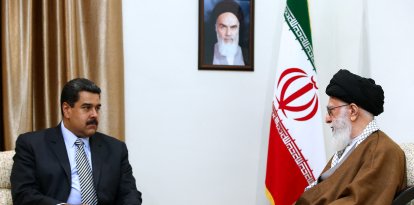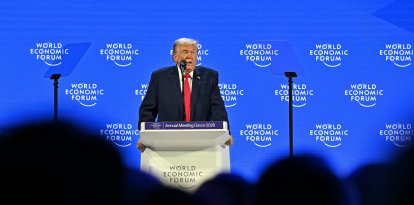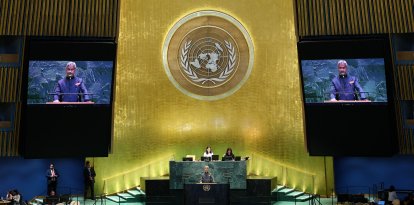Milei, against inclusive language: a victory for common sense, a defeat for the progressive agenda
The Argentine government decided to ban the use of the so-called 'inclusive language' and the gender perspective in public administration. Why is this measure more important than it seems for the South American country?

(AFP)
The Argentine Government, headed by President Javier Milei, decided prohibit the so-called inclusive language and gender perspective in public administration.
Manuel Adorni, presidential spokesman, was in charge of announcing the measure during a press conference: "We will proceed to initiate proceedings to prohibit inclusive language and everything related to the gender perspective," he said. And he added: "It will not be possible to use the letter 'e,' the at sign or the 'x'."
Likewise, the official stated that in the drafting of public documents "the unnecessary use" of the feminine gender will be avoided.
Adorni stressed that the government is not willing to discuss inclusive language and asserted that the gender perspective has been used as "a business of politics."
The Ministry of Defense, the first organ to implement the ban on inclusive language
The first body to take this decision was the Ministerio de Defensa (Ministry of Defense), to apply it in its structure and in the Armed Forces, with the aim of avoiding misinterpretations in the transmissions.
In this way, the rules of the Real Academia Española (RAE) and the regulations and manuals of the Army will have to be respected in order not to fall into a "deviation or denaturalization of Spanish not standardized or endorsed by a corresponding legal plexus," Therefore, "the correct use of the Spanish language is imposed, which is the one that has been used for the framing and guidance of all regulations, manuals and documents of writing and symbology of the Army, as well as aeronautical and naval ones," said the Minister of Defense, Luis Petri, in a resolution.
"What this measure intends to do is to generate greater rationality in the management of communication."
In exclusive statements for Voz Media, Ricardo Rojas, former judge and Argentine writer, was in favor of the decision taken by the Government of Javier Milei. "It seems to me that the measure has to do with the use of the Spanish language in documents and communications of the public administration, which is the official language that should be used in those areas," he said.
Likewise, the intellectual harshly criticized inclusive language. In this regard, he pointed out: "It does not constitute a language properly speaking, it is a deformation, like slang. I do not think it has anything to do with the real fight against discrimination or gender equality, but has been used with political motives, which is inappropriate for public offices."
Rojas argued that "the distortion of language known as 'inclusive language'" has no relation to discrimination. "On the contrary, it clearly expresses an ideological stance," he maintained. He added: "True inclusion is achieved by treating everyone equally in the exercise of their rights, and that is done by other means. Changing an 'o' for an 'e' has no relevance from the point of view of the protection of rights, and often acts, on the contrary, as a distraction to avoid seeing the real problems of discrimination and segregation."
The writer also referred to the difficulties resulting from the use of inclusive language. "Language has been distorted so much, in so many ways, with the excuse of 'inclusion', that sometimes it is difficult to understand what is being said." And he added that "the official language for government communication in Argentina is Spanish, and if Spanish is used well we all benefit, because we can understand each other better."
However, Rojas clarified that "regardless of whether the Government uses the official language in its communications, everyone can speak as they wish, what should not exist is the right to want to impose one way of speaking on me for political or ideological considerations."
He also concluded that "those who want to use inclusive language in their conversations can do so freely. The problem they will have is that their interlocutors will probably not be able to understand them. Language is a form of communication, which is generated spontaneously, by evolution, it is not imposed by political motivations, and when you want to distort it artificially, it ceases to serve as language."
"The real control of language is not held by some individuals, but by the community of speakers."
To delve deeper into the issue of inclusive language, Voz Media spoke with Argentine Wenceslao Grillo, a language expert. Like Rojas, the intellectual expressed his support for the ban announced by the Milei Administration. "While it is true that the government has more important things to do, I don't think this decision affects its ability to do them. Every organization is represented by the way it communicates with other organizations and with the public. Public administration is no exception, and progressive language full of "todes" and "tod@s" makes it look in a way that is at odds with the general attitude of the current government."
Grillo explained that "it is common for an organization or company to dictate to its members or employees the way it wants its representatives to communicate with the public; the State need not be an exception."
In addition, the expert expressed harsh criticism against inclusive language. From the point of view of implementation details, he pointed out that "things like 'tod@s' or 'todxs' are indefensible because the '@' has no associated pronunciation and an 'x' between two consonants is not compatible with the phonotactic, i.e. with the pronunciation of Spanish. Similarly, there is an attempt to say that writing 'abogado' or 'abogada' is wrong and 'abogade' should be preferred so as not to emphasize either gender, but at the same time it is intended that a woman, instead of 'presidente,' which already has the 'e,' should be 'presidenta'."
Grillo argued that advocates of this type of language "tend to have rather confused ideas regarding the relationship between grammatical gender and biological sex." However, he pointed out that "Spanish is a language with real grammatical gender, associated with each noun, and not with its referent (the thing or person it mentions)."
"In Spanish we have some rules that, for example, dictate the use of feminine grammatical gender pronouns to refer to specific female persons, i.e. Mafalda is 'she,' and not 'he'," Grillo continued. "But many times, for the same thing, we have a noun of each gender, for example: a thing and an object. And this often makes us use, correctly, a grammatical gender that does not agree with that of the person we are referring to. For example, Arnold Schwarzenegger is clearly a very masculine man, but we can say without a problem that he is a wonderful person," he added.
"Attempting to associate biological sex with grammatical gender more strongly than language demands can never lead to a good end," he stressed.
The Argentine specialist also asserted that the biggest mistake made by advocates of inclusive language is, perhaps, the lack of knowledge of other languages. "In the world there are many languages in which there is no grammatical gender. Some examples are Chinese, Finnish and Hungarian, where there is no word for 'he' and no word for 'she.' Nor do adjectives have either masculine or feminine forms." Therefore, he noted that "in most cases, if for some reason it is important to point out the sex of the person, you have to say things like 'female teacher'."
Grillo said that "if it were true that by eliminating grammatical gender differences in language, we would at the same time eliminate machismo, then in countries where languages without grammatical gender are spoken, there would be no differences between the sexes. However, we see that this is not the case. Finland has a very egalitarian attitude towards the sexes, Hungary is an intermediate and in China you see clear differences between men and women."
"An important, though often overlooked, function of language," the specialist continued, "is to show the groups to which the speaker belongs. He who speaks with a porteño accent, for example, shows with that that he is porteño or that he has lived in Buenos Aires for many years. Similarly, the relatively few who use inclusive language show that they belong to a certain ideological community. That is what inclusive language is good for. And forcing speakers who do not agree with that ideology to use that language could serve to make people believe that that ideology enjoys more support than it really does, with the consequences that this could entail."
As to whether it is plausible that modifications in language occur, Grillo explained that, in reality, "language changes all the time. New generations seek to distinguish themselves from their elders and invent new words. New technologies also appear and require new vocabulary to refer to them. In addition, rarely used elements cease to be understandable, the logic of some rules is no longer understood and speakers begin to use others, and so on." Therefore, he pointed out that language needs to be modified "to remain current, to reflect generational differences, as well as to remain understandable and manageable for speakers."
However, Grillo clarified that modifications cannot be forced to impose a political agenda. "The only way in which a language changes or is preserved is that the majority of speakers make the change or maintain the conservative form, and it is very difficult to impose a way of speaking on a community. In the best case scenario, a situation of diglossia ends up being generated, that is, the coexistence of two forms of the same language in a population: on the one hand, the form of the language that speakers actually use when they are at ease and feel free, with their family and friends, even if it is considered incorrect or forbidden, and on the other hand, the formal, approved or legally sanctioned form of the language, which they use in more formal communications."
And he concluded that "a minority dictating to people how they have to speak in their homes is something that does not work. It will only succeed in dictating how they should express themselves in more or less formal settings. The real control of language is not held by a few individuals, but by the community of speakers."

























